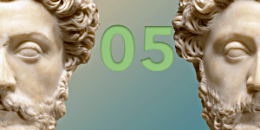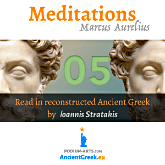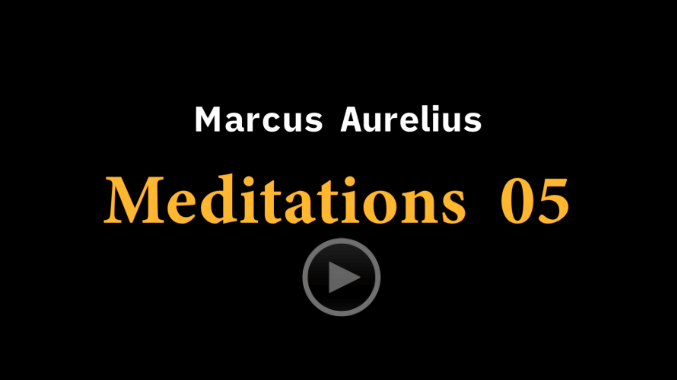• Meditations 05 •
• Marcus Aurelius Antoninus •

Duration: 34 mins 24 sec
Unabridged
Recorded: 2024
Price : $/€ 15 (audio) - 25 (video)
About the Meditations series
The "Meditations" (Greek title: Τῶν εἰς Ἑαυτόν) is a series of personal reflections and philosophical musings written by Marcus Aurelius, Roman emperor and Stoic philosopher. The book is considered one of the greatest works of Stoic literature and provides insight into the emperor's personal beliefs and values. The reflections were written over a period of several years, primarily while Marcus was on military campaign, and cover a range of topics including death, the nature of existence, and the pursuit of wisdom and virtue.
Out of the richness and variety of thought with which Marcus Aurelius has endowed humanity, Book 5 of the "Meditations" offers particularly profound insights.
One central idea is the value of dedication to purpose and the motivational power of considering how our actions benefit society — especially when more pleasant distractions beckon. Alongside this is the realization that our disposition is, fundamentally, a matter of decision. This notion might prompt questions about the sincerity of our feelings, yet it is a powerful reminder of our agency.
A recurring theme, not only in Book 5 but throughout the Meditations, is “nature.” This broad, inclusive concept feels intuitively understood by many, yet defining it in universally accepted terms is elusive and fraught with challenges. Even so, the term retains its strength and significance in context. Particularly moving is Marcus Aurelius’s reverent acknowledgment of the earth — a subtle but impactful reminder of how easily we neglect to honor what we take for granted.
Another key reflection involves balancing our obsessions — often directed at elusive goals — with the equally virtuous but overshadowed aspects of life. This ties closely to the idea of persistent, honest striving toward one’s goals, independent of external recognition, though such recognition may remain sweet to the heart.
Marcus Aurelius also extols the virtues of simplicity and directness, illustrated in his mention of an Athenian prayer, which likely sought to reject excessive pomp. Finally, he underscores the importance of accepting one’s “lot,” especially its harsher aspects, since not many people would resist “good” fortune. His insights resonate with the tension in contemporary times between blaming victims of misfortune and avoiding personal responsibility for others’ suffering.
Reading Book 5 is not merely engaging but also thought-provoking, prompting frequent comparisons to the complexities of modern life.
In the videobook you can follow the text of the Haines edition of "Meditations" book 05. Alternatively, those using the audiobook can find the text also on many places online, like Perseus Library or an English translation by George Long.
About the digital formats
 Both the audio recording and the videobook contain the complete, unabridged Ancient Greek text of the 5th book of the "Meditations" of Marcus Aurelius. After purchase you will be able to download the relevant mp3 audiobook a/o mp4 videobook file by clicking on the relevant green buttons. Translated captions in English; other languages on request.
Both the audio recording and the videobook contain the complete, unabridged Ancient Greek text of the 5th book of the "Meditations" of Marcus Aurelius. After purchase you will be able to download the relevant mp3 audiobook a/o mp4 videobook file by clicking on the relevant green buttons. Translated captions in English; other languages on request.
You can listen to three fragments of “the Meditations, book 05”, an audio sample of the present recording. Please, click on the play-button bellow and, if you wish, follow the Ancient Greek text lower on the page, or alternatively watch the video. Thank you!
ΤΩΝ ΕΙΣ ΕΑΥΤΟΝ 05
18. Οὐδὲν οὐδενὶ συμβαίνει ὃ οὐχὶ πέφυκε φέρειν. ἄλλῳ τὰ αὐτὰ συμβαίνει καὶ ἤτοι ἀγνοῶν ὅτι συμβέβηκεν, ἢ ἐπιδεικνύμενος μεγαλοφροσύνην, εὐσταθεῖ καὶ ἀκάκωτος μένει. δεινὸν οὖν ἄγνοιαν καὶ ἀρέσκειαν ἰσχυροτέρας εἶναι φρονήσεως.
7. Εὐχὴ Ἀθηναίων: ὗσον, ὗσον, ὦ φίλε Ζεῦ, κατὰ τῆς ἀρούρας τῆς Ἀθηναίων καὶ τῶν πεδίων. ἤτοι οὐ δεῖ εὔχεσθαι ἢ οὕτως ἁπλῶς καὶ ἐλευθέρως.
27. “Συζῆν θεοῖς.” συζῇ δὲ θεοῖς ὁ συνεχῶς δεικνὺς αὐτοῖς τὴν ἑαυτοῦ ψυχὴν ἀρεσκομένην μὲν τοῖς ἀπονεμομένοις, ποιοῦσαν δὲ ὅσα βούλεται ὁ δαίμων, ὃν ἑκάστῳ προστάτην καὶ ἡγεμόνα ὁ Ζεὺς ἔδωκεν, ἀπόσπασμα ἑαυτοῦ. οὗτος δέ ἐστιν ὁ ἑκάστου νοῦς καὶ λόγος.

